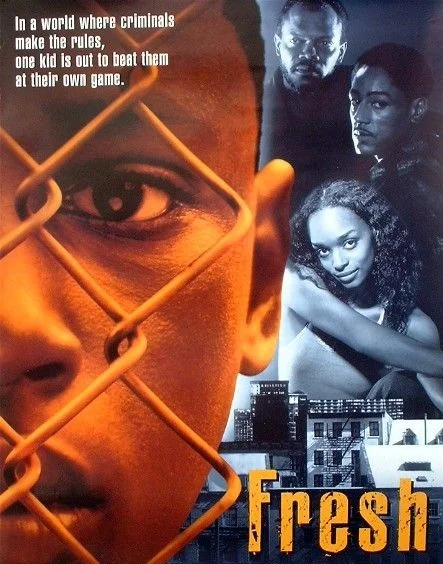Way Back: Fresh (1994)
Early 90’s cinema had an obsession with the inner city. Perhaps no decade before or since gave us more films telling black stories. While these weren’t always biographies, they felt extremely personal in their portrayal of normal neighborhood life. Whether it was Boyz n the Hood, Friday, Menace II Society, Juice, or any number of others, these films were lauded, and attained almost folklore status in the culture. For some reason, one movie in the genre hasn’t received that acclaim: 1994’s Fresh.
Boaz Yakin’s directorial debut, Fresh, was released in September of 1994 by Miramax films with a modest budget of about $3.5 million. While the movie made just over $8 million at the box office, it was well-received by critics at several major publications including then-Chicago Times writer, Roger Ebert.
Where the news did their best to tell us how bad black communities were, these films worked to humanize us. They didn’t shy away from the drugs, crime, and violence, but rather sought to show why it can go down that way sometimes. These stories were usually focused on local drug rings and the tales of their inevitable rise and fall. It’s unlikely that we get the stories of the low-level criminals, and even less likely that we learn about the children that are involved.
That’s the harsh truth that Fresh uncovered. Our main character, Fresh, played by Sean Nelson, is a 12-year old drug runner for two different drug lords in his community. We watch him strive and navigate a world where he is always the youngest, but seldom the least-informed. Stuck living with his aunt, sister, and an apartment packed full of cousins, he saves his hustle money for the day he’ll really need it. Sure he tries to be a kid, but many of those innocent moments are drowned out by the severity of his situation. The narrative shows us that people turn to illegal activity to survive, not only for a life of luxury. His friends note how he works often but still arrives to school in old clothes. The kid doesn’t mind, and he knows few of his peers (if any) can relate to the responsibilities he carries at a young age.
The film shows, Samuel L. Jackson in one of his first large roles as Fresh’s father. Depicted as something of a deadbeat, he mostly speaks to Fresh during chess games in the park. The exchanges are tense and far from friendly, but the advice he gives about the game ends up serving as clever foreshadowing for the finale. A slim Giancarlo Esposito plays the drug lord, Esteban, long before he became Breaking Bad’s Gus Fring.
Sean Nelson received no award consideration for his masterful performance, but his work didn’t go completely unnoticed by the industry. He would reappear in The Wood in 1999, and a string of other pictures well in to the 2000’s. Yakin eventually scored a hit when he directed Remember the Titans in 2000, but he’ll always have Fresh as the hidden gem of the 90s.








